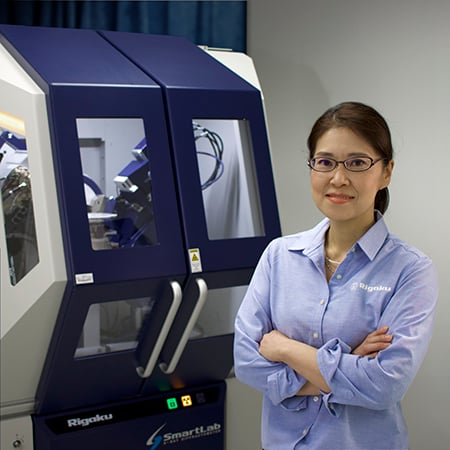Application Note B-XRD1020
Introduction
The crystal systems of pharmaceuticals and foods may change due to factors such as temperature and humidity. The climate of Japan in particular exhibits extreme changes in temperature and humidity, with hot and humid summers, and dry, low-temperature winters, and these are poor conditions as an environment for synthesizing pharmaceuticals or storing foods. Therefore, there is a need to conduct measurement beforehand under various atmospheric conditions, and determine what sort of changes these materials undergo in the actual environment. Thus we evaluated thermal changes and changes in the crystal structure of pharmaceuticals by simultaneously measuring X-ray diffraction (XRD) and differential scanning calorimetry (DSC) while varying humidity.
Measurements and results
It is possible to simultaneously determine thermal changes and changes in crystal structure by simultaneously measuring XRD and DSC. Here, measurement was conducted on the sweetener trehalose dihydrate. Figure 1 shows the results of heating trehalose dihydrate in a dry atmosphere. It was found that, at around 85°C, dehydration occurs and the material changes to an anhydride or amorphous material with poor crystallinity; and then, via an exothermic reaction at around 160°C, the material changes to an anhydride with good crystallinity.
Figure 2 shows the results of heating in a high-humidity atmosphere. There was no anhydride or amorphous material with poor crystallinity, of the sort, which appeared in the dry atmosphere, and the dihydrate changed directly into an anhydride with good crystallinity.
If the crystal structure produced by a humid atmosphere during heating differs, even with the same substance, then the changes in structure can be easily observed by simultaneously measuring XRD and DSC. .jpg?width=550&height=365&name=B-XRD1020%20Figure%201%20Results%20of%20simultaneous%20XRD-DSC%20measurement%20(dry).jpg) Figure 1: Results of simultaneous XRD-DSC measurement of trehalose dihydrate (in a dry atmosphere).
Figure 1: Results of simultaneous XRD-DSC measurement of trehalose dihydrate (in a dry atmosphere).
.jpg?width=545&height=358&name=B-XRD1020%20Figure%202%20Results%20of%20simultaneous%20XRD-DSC%20measurement%20(humid).jpg) Figure 2: Results of simultaneous XRD-DSC measurement of trehalose dihydrate (in a high-humidity atmosphere).
Figure 2: Results of simultaneous XRD-DSC measurement of trehalose dihydrate (in a high-humidity atmosphere).

